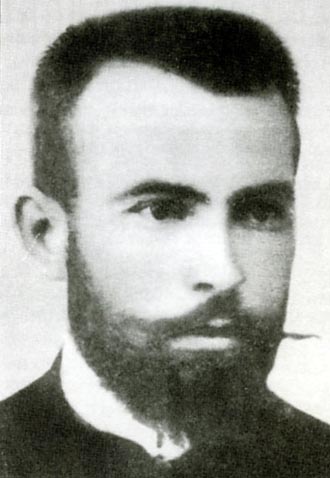• 1903 – ‘On Macedonian Matters’ •
Oh, Macedonians! It is time we realized that the greatest demon Macedonia must battle against is none other than Bulgaria

• 1903 – ‘On Macedonian Matters’ •
What is most essential for us is internal unity, mutual unity in
Macedonia, we do not need Serbs, Bulgarians or Greeks, for we
are none of these; we do not need Patriarchists, or Exarchists
because we are only Orthodox Christians.
• 1903 – ‘On Macedonian Matters’ •
Thus, the terms Serb, Bulgarian, and Greek have served their
time in Macedonia and there is no longer any place for them. It
is time for them to be changed for a name common to all
Macedonian Slavs, the name Macedonian.
• 1903 – ‘On Macedonian Matters’ •
Here is what one might say to those who claim that Macedonian
as a nationality has never existed: it may not have existed in the
past, but it exists today and will exist in the future.
• 1903 – ‘On Macedonian Matters’ •
I am a Macedonian and this is how I see the position of my
country: it is not Russia or Austria-Hungary that are the enemies
of Macedonia, but Bulgaria, Greece and Serbia. Our country can
be saved from ruin only by struggling fiercely against these states.
• 1905 •
I am a Macedonian, I have a Macedonian’s consciousness
so I have my own Macedonian view of the past
future of my country.
• 1923 •
There used to be and there still is an independent Macedonian
culture, and it has been the strongest weapon in helping the
Macedonians to preserve their present-day cultural matrix and
survive all the reversals in the history of their fatherland: not
Byzantium nor Bulgaria nor Serbia, nor Turkey, could make
changes in the character of the Macedonians of such a nature as
to destroy their individuality and estrange them from their Slavic
forefathers.
• 1923 •
King Marko is the son and pride of Macedonia and one of the
three great conquerors who spread the name of their land far
beyond its territories: (1) Alexander of Macedon spread the glory
of Macedonia as far as the Central Asian rivers of Amu Darya
[Oxus] and Syr Darya [Jaxartes], and also to India and the Indian
Ocean; (2) The holy Cyril and Methodius spread the
Macedonian word and script among all the Slavic peoples, and
(3) King Marko placed under his authority and under that of the
Macedonian muse all popular singers and peoples on the Balkan
Peninsula, including you, the descendants of his sworn enemies.
• 1924 •
Is there indeed a Macedonian national culture and Macedonian
national history? Fortunately enough, we can give an affirmative
answer: yes, there is a Macedonian culture and Macedonian
national history, distinct from those of the Serbs and Bulgarians,
even though they have so far not been the object of extensive and
impartial study: the Serbs and Bulgarians have one-sidedly and
with a strong bias chosen from Macedonian culture what glorifies
their own national name, ignoring questions of capital
importance only because they do not concern them or contradict
the national aspirations of the choosers and their compatriots.
Unfortunately, the independent study of Macedonian history is
only beginning now, carried out by those same Macedonians
who towards the end of the past century started disbelieving
Belgrade and Sofia scholars, who had almost unanimously
declared that during the Middle Ages the Slavs were a
disorganized people, without national consciousness, who were
saved from Greek assimilation only thanks to the establishment
of the state of the Turan Bulgars, and later of the state of the
Nemanja dynasty. We, Macedonians, believe this to be an
erroneous idea as a result of which the Bulgarians and Serbs
have wrongly understood not only the history of the
Macedonians and Macedonia in the Middle Ages, but also the
very history of the Serbs and Bulgarians.
• 1925 •
We will fight with Greeks because they are our only historic and
age-old enemies. Our complete Macedonian national history is
full with fights against Greeks.

Yes, Macedonian culture and history are quite separate from Greek, Bulgarian, and Serbian culture and history; they have never been the object of an impartial and detailed study. The Greeks, Serbs, and the Bulgarians most unfairly took from Macedonian culture only what they could make use of for the glory of their own national names; ignoring facts of capital importance either because they did not concern them, or because they contradicted their own national aspirations. Unfortunately, the Macedonians themselves are only now beginning to study Macedonian history, having realized, towards the end of last century, that they could no longer trust the historians of Athens, Belgrade or Sofia…

